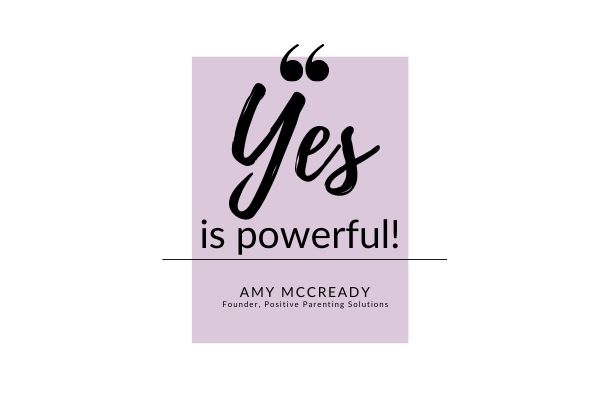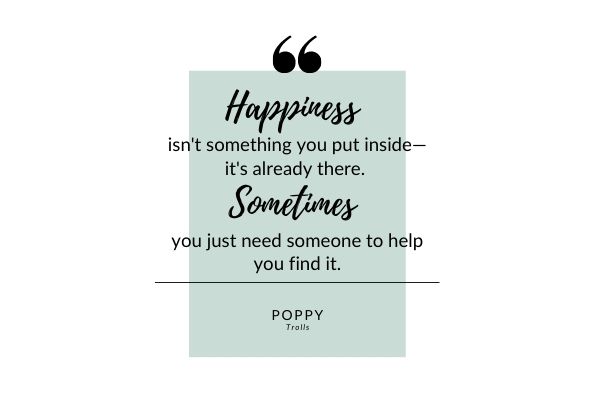
Just imagine…
You’re 4-years-old, walking to the park with your mom and dad. The sun is shining, there’s a soft breeze in the air, and the twirly slide is calling your name. You can’t wait to get there.
Just as you step onto the sidewalk, your mom shouts, “Don’t go in the street!”
You hadn’t planned on walking in the street. At least not until this very moment. You stare at the smooth black pavement glistening in the sunlight. It’s just begging for you to run across it!
Why, oh, why did your mom even mention the street? Had she said, “Please walk with us on the sidewalk,” you probably wouldn’t have even noticed it.
Now, it’s all your little mind can think about.
As parents, we can give commands to our children positively or negatively. Both, essentially, are asking the same thing, but the delivery–and the impression it leaves– can be exponentially different.
And in a world where the average child hears 432 negative comments or words per day versus 32 positive ones (Source: K. Kvols, Redirecting Children’s Behavior), it’s safe to say which style we typically rely on.
Don’t be late! Stop talking with your mouth full! Don’t touch your sister! No more fighting!
I’m sure a few of these sound familiar. But you see, when most of the language we use with our kids is negative (don’t, stop, no more, etc.) we create problems for both them and us.
Negative language is confusing, demeaning, and comes off as harsh. Kids don’t want to feel talked down to any more than adults do.
Not to mention, it invites All. The. Power. Struggles.
Fortunately, the fix is as simple as swapping out those negative phrases for more positive ones. Trust me; this will do wonders for your child’s misbehavior!
Why? Because positive language empowers kids! It tells them that they can make good choices, and we value what they have to say. It’s a massive boost to their self-esteem.
Here’s the not-so-fortunate part. It may be simple, but simple doesn’t always mean easy. Making these changes isn’t going to happen overnight, especially if you’ve been using negative commands for years–it’s just second nature at this point!
But with a bit of time, practice, and intentional effort, I’m confident you’ll get there.
To get you started, here are 3 tips to avoid power struggles by using positive language.
Tip #1: Practice Using “Do” Commands
Don’t run in the street! Don’t talk with food in your mouth! Don’t forget to brush your teeth!
Do any of these sound familiar?
To put an end to the power struggles, try to rephrase these statements using “Do” commands….
Please walk on the sidewalk. Keep your lips together when chewing food, please. When your teeth are brushed, we’ll be ready for storytime!
Why “Do” Commands Lead to More Cooperation
As parents, we probably say the word “don’t” more times than we can count in one day. And with good reason! We want to keep our children safe, healthy, and happy. Naturally, we have to tell them what they shouldn’t do.
Right?
The problem isn’t so much what we’re asking but rather how we’re asking it. You see, when we use “don’t” commands, our kids automatically have to “double-process” what we’re telling them.
They think, What does Mom NOT want me to do? AND, What does she want me to DO instead?
Not only is this discouraging, but it’s also incredibly confusing–especially for young children. “Don’t” reinforces the negative behavior and brings it to their full attention (remember the street scenario above?).
You say, “Don’t run in the street!” and they think, “Gee, running in the street sounds really fun right about now.”
You say, “Don’t play on your iPad,” and they think, “iPad, iPad, iPad! I REALLY want my iPad!”
Instead, try switching up your phrasing by stating what you do want instead of what you don’t. (Bonus points if you ask politely.)
For example, if you want to say “DO walk on the sidewalk,” try, “Please walk on the sidewalk. It’s so nice knowing we are being safe.”
Or, if you’re going for “DO stay away from the iPad,” try, “Let’s play outside while the weather is nice and save your screen time for when we’re in the car later.”
Doesn’t that sound much better?
Right off the bat, this eliminates the need to “double-process” the command. Your child knows exactly what you’re asking and feels especially significant because you asked in such a polite and respectful way.
It also does away with any looming frustration that tends to go hand-in-hand with negative comments. You’ll take their thinking from, Why can’t I? to Yes, I can!
And with that boost of empowerment in your daily lives, you’ll be sure to see less misbehavior.
Tip #2: Find Opportunities to Say “Yes!”
One of the best ways to reduce power struggles is to shift our “no’s” into something that — to a child — feels more like a “yes.”
It’s Saturday afternoon, and you and your 10-year-old son are perusing the aisles of your local pet store. All you need is a bag of dog food, but you’re making it an outing because you both enjoy peeking in on the new puppies and kittens.
You’re deeply enthralled with an adorable little furball when, all of a sudden, you hear your son call to you from across the store.
“Mom, come check out this baby alligator! Can we buy him?”
Sure, there are many amazing parents out there that would love to bring a pet alligator home. But you are NOT one of them. Of course, now you feel backed into a corner. Up until now, you’ve been a positive language rockstar! But that ends today.
And you know what? That’s fine!
Parents can’t (and shouldn’t) give their children every single thing they ask for. If they did, I’m pretty sure the world would be run by entitled kids fueled solely on dino nuggets and candy.
So let’s set the record straight right now. “No” isn’t the problem. How we present the “no” can be.
Let’s say your immediate reaction is:
“No. We are absolutely NOT getting a pet alligator today, tomorrow, or ever!”
Can you see how something so negatively charged may be discouraging to your 10-year-old? He was only asking a question, but your answer leaves him frustrated, disheartened, and ready to push back.
So what can you do when the answer is “no,” but you want to maintain that positive language?
Try shifting that power struggle paradigm by finding a way to turn that “no” answer into something that more resembles a “yes.”
“We can’t buy an alligator to take home, but let’s pick a day when we can come back and visit it in the store. Would you rather come back Sunday afternoon or Monday evening?”
This way, you aren’t driving home with a reptilian creature in the backseat, but you also don’t have to say no.
While this may seem tricky at first, I’m willing to bet that you’re actually much better at disguising no’s for yes’s than you think.
Maybe it’s your toddler, asking for the hundredth time if she can wear her purple polka dot snowsuit to the swimming pool because it’s her “favorite color in the whole wide world!”
“You can absolutely wear your snowsuit inside the house with the A/C on high! But let’s stick to wearing your purple swimsuit at the pool. Snowsuits are hard to splash in.”
Or perhaps your fresh-from-the-DMV teen really wants to learn how to drive in your classic (and newly restored) ’65 Mustang.
“Buddy, you’d look so awesome driving that car, but it can be really hard to learn the rules of the road in a manual transmission. Why don’t we start in an automatic until you’re more confident behind the wheel?”
See? Even when the answer is “no” you can always squeeze a refreshingly positive “yes” in there somewhere.
Try a Yes Day!

Another way to find more opportunities to say “yes” throughout the day is quite simple. Just say “yes!”
A popular trend in recent years has been for families to institute a “Yes Day” with their kiddos. Typically, this is one full day when parents say yes to any request (with ground rules and within reason) their kids ask.
Breakfast for dinner? Yes!
Mini golf followed by a movie? Absolutely!
Wear pajamas to the candy store? Um, if you say so!
The intention behind the idea of a Yes Day is to give your children something all Positive Parenting Solutions parents know they desire–a strong feeling of belonging and significance!
Saying “yes” to their requests tells them that you’re interested in what they have to say and what they want to do. They’re an essential part of the family, and you recognize all of their contributions.
Yes is powerful!
Pro Tip: Positive Parenting Solutions Members, review Step 1 Lesson 2 of the 7-Step Parenting Success System® course to understand more about your child’s desire for belonging and significance.
Tip #3: Whenever Possible, Smile When You Speak
You may be thinking, Okay, Amy, what’s with you? This is getting a little weird.
Trust me. I get it.
But, believe it or not, lots of research shows that smiling when we speak has a significantly positive impact on both us and those we’re talking to! It may seem a bit out there, but I promise you’ll soon see just how helpful it can be when trying to switch from negative to positive language.
Because the truth is, it’s really hard to say anything negative when you’ve got a smile on your face.
Let’s give it a try…
With your brightest smile, repeat after me: “Don’t ride your bike without a helmet on. It’s really dangerous, and I don’t want you to get hurt.”
I’m willing to bet that felt pretty awkward (and possibly looked a little terrifying). Why? Because the emotion on your face didn’t match what you were saying.
Now, let’s try it again. Only this time, let’s also rephrase the sentence using what we learned in the first two tips.
Again, be sure to show off those pearly whites: “Please wear your helmet when you’re on your bike. I love knowing that you’re being safe.”
Ahhh, I bet that felt much better! And the funny thing is, you were still getting the same point across…just in a more positive way.
Final Thoughts
As the saying goes, old habits die hard! And, unfortunately, for most parents, using negative language is a very old habit.
Right now, it may seem an impossible feat. You ask, repeat, remind, and yell, only to feel nothing but guilt a few moments later. “No,” “don’t,” and “can’t” are a few of your most-used vocabulary words, yet the power struggles remain.
But that’s the very reason why Positive Parenting Solutions came about in the first place! I wanted to meet parents right where they are–in the hardest of places–and give them hope for a brighter, more positive way to parent.
Yes, you can empower your children with positive language! You can reduce the amount of misbehavior you see every day. And you absolutely can be the positive parent you’ve always dreamed of becoming.
We’re happy to help you every step of the way!





 A Guest Post from Amanda Salzhauer & Dr. Dale Atkins
A Guest Post from Amanda Salzhauer & Dr. Dale Atkins


